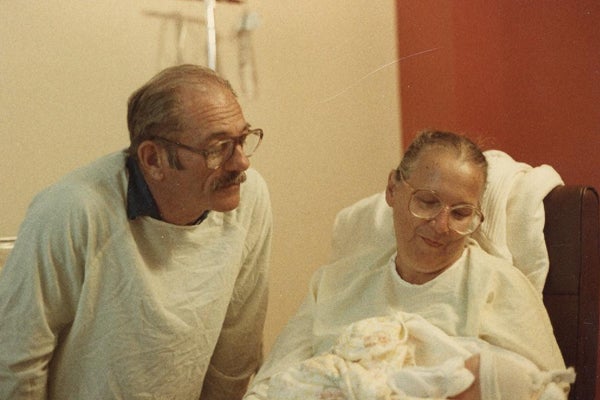I’m losing my grandmother’s native language
Listen
Rose McCarthy with Katie Booth and her baby sister Lena Booth.(Courtesy of Barrie Booth)
I learned to sign before I could speak.
I wasn’t deaf, but my grandparents were, and when I was a baby I spent my days at their house, where I was immersed in Deafness.
A child can begin signing months before she speaks, and I picked up the language quickly. They taught me how to sign not only with my hands but with my face and my body. As a baby, my first sentence was “Birds fly away, all gone.” To make the sentence: begin with your hands close to your body and then flap the wings away. It ends with helplessness on your face, as though nothing could have been done about it.
At my grandparents’ home everything was easy to understand with just our eyes: The lamp blinked on and off when the telephone rang. On television, we watched mostly sports and weather. And, even after I learned English, we always signed.
Back then, I believed that I was on a trajectory toward deafness. As surely as I would have grey hair and wrinkles, I believed that someday I wouldn’t be able to hear. At night, I would practice deafness. I’d pull the batting from a stuffed bear and fill my ears against the sounds of the world. I found I didn’t mind it.
Sign language was fundamental. So much so that the fact that my grandmother could speak was like some dark magic to me. She didn’t do it often, and never in front of strangers, but I knew she could. I just didn’t know how.
Then when I was six or seven, she showed me. She lit a birthday candle, held it in front of my lips, and told me to say puh. The flame flickered. “Like that,” she said.
The candle helped deaf children see their sounds. And that’s when I started to hear the story of speaking.

Rose and Harry McCarthy hold Katie Booth as a baby. (Courtesy of Barrie Booth)
My mother told me that for a century, families sent their children to boarding schools, where deaf kids were supposed to learn to speak and lip-read. Sign language was not allowed.
My grandma grew up in a Deaf family, and Sign was her first language, too. But away at school, her hands were slapped black and blue with rulers, with the paddle back of a hairbrush. Still, she stubbornly brought Sign everywhere she went. She taught other students at her school, and she taught her first husband, my mother, and me.
My grandma, Rose McCarthy, shaped my hands and adjusted my face and kept her language alive.
There was always a distance between our experiences, between hearing and deafness. But I imagine her watching me as a baby, and knowing her teachers were wrong, knowing that Sign is something natural, maybe close to holy.
Even when I was only 10, it felt like it was my responsibility to carry on our language. But instead I grew toward the hearing world, away from Deafness.
I would sign to myself alone at night, trying not to forget. Tented under my covers, I had whole conversations, signed out my favorite songs, told my oldest stories.
But I was ashamed to sign in the daytime with my grandmother. I didn’t want her to see our language slip away.
By the time grandma died, when I was nineteen, I could barely sign at all.
Sometimes I still sign in bed at night, trying not to lose this essential part of myself. But even in my dreams, my fingers stumble and stutter.
This radio essay is an edited version of of Katie Booth’s original, which appeared in “Vela Magazine.”
WHYY is your source for fact-based, in-depth journalism and information. As a nonprofit organization, we rely on financial support from readers like you. Please give today.

